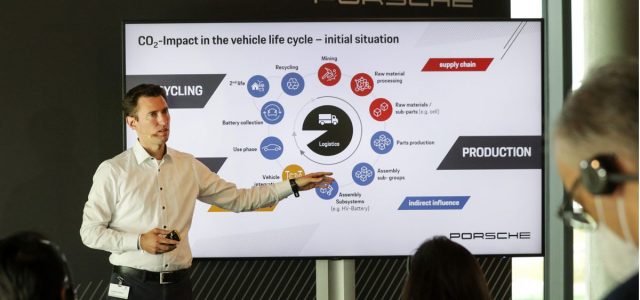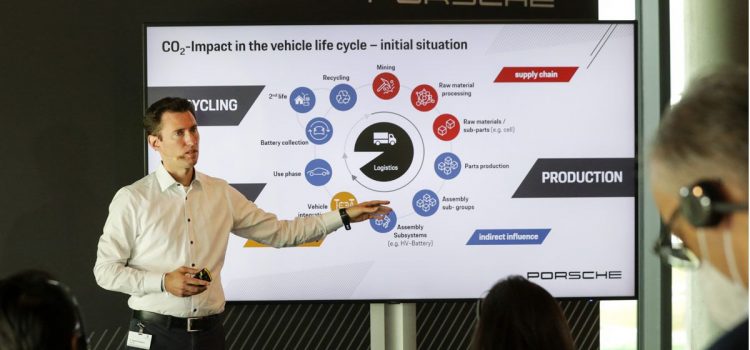


You probably don’t need as big a battery in your EV as you think.
Porsche
What’s the optimal size for an electric-vehicle battery pack? Of course, it depends on numerous factors — and who you ask — but Porsche engineers believe they’ve figured it out.
“At the moment, we think 100-kilowatt-hours is the right battery size,” said Benjamin Passenberg, manager of high-voltage system concepts at Porsche, while speaking with press during a media event last month. That sounds like an oddly convenient number, but numerous reasons back up this claim.
Cramming the largest battery possible into an electric vehicle can get you impressive range and bragging rights at your local charging station, but in normal use, this is not only unnecessary, it’s also counterproductive. According to Porsche, more than 95% of motorists travel less than 124 miles per day, so why pay for a gigantic battery pack you don’t really need and then have to drag it around everywhere you drive? It doesn’t make a lot of sense.
Overall carbon emissions from the battery-manufacturing process are huge.
Porsche
Smaller batteries are lighter, which can improve vehicle dynamics and efficiency — critical elements of any Porsche — though they also take far fewer resources to build, which is much better for the environment and your wallet.
According to Porsche, the Taycan all-electric sedan’s battery pack accounts for about 40% of all carbon-dioxide emissions produced during manufacturing — yes, 40%. This is because mining and refining the necessary raw materials requires vast quantities of energy, as does shipping them around the world and assembling the battery cells themselves. For a little perspective (depending on how it’s charged, of course), Passenberg said, driving also accounts for about 40% of the Taycan’s lifetime carbon emissions, meaning just building the car’s battery pack results in roughly as much in the way of emissions as driving it around for at least 15 years, which Porsche says is the general lifespan of cars, though its vehicles tend to remain in service much longer. More than 70% of all Porsches ever built are still on the road. From both CO2 and cost perspectives, the smallest battery pack you can get away with is probably the best.
The good news is, as charging infrastructures continue to grow, it becomes easier and easier to make do with less range. Still, this hasn’t stopped rival companies from offering electric vehicles with huge batteries. The Lucid Air can go up to 520 miles between charges, and the new GMC Hummer EV Pickup brandishes a roughly 200-kWh electron reservoir, an absolutely mammoth assembly that’s necessitated by its gargantuan size and brick-like shape.
An appropriately sized battery can deliver better performance than larger packs.
Porsche
Reinforcing the claim that 100-kWh is just about the right size, in simulated testing, a Porsche Taycan fitted with an 85.1-kWh battery pack lapped the Nürburgring 0.7 second faster than a model fitted with a smaller — and 240 pound lighter — 70-kWh battery. Even though the svelter car accelerated a tiny bit quicker, the larger battery provided more sustained performance, which resulted in the slightly faster lap time.
Flipping the script, that simulated Taycan with the 85.1-kWh battery performed better than one fitted with either a 100- or a 130-kWh battery. This is the point at which additional weight started to take its toll and lap times increased.
Even though it doesn’t offer the highest range in the car business, if you need to take a cross-continent trip in a Tacyan, you’ll be OK. It’s more than competitive, plus the car is able to charge up lickety-split thanks to its advanced 800-volt electrical architecture. Hooked to an appropriate DC charger, Porsche’s all-electric sedan can gain 62 miles of range in just 5 minutes, less time than it takes to walk into a rest-stop plaza and buy a snack. And in the future, Passenberg promises next-generation battery designs will be more environmentally friendly, offer greater range and, yes, charge even faster. Porsche engineers are working to reduce the amount of raw materials like aluminum and cobalt that are needed in batteries, pushing partner companies to use green energy and optimizing supply chains to minimize transport distances. These changes, and others, should make the company’s next-generation batteries, which are set to debut in upcoming EV models, result in the production of 26% less CO2 per kWh than the batteries used in the Taycan.
All these factors will be important in the coming years as Porsche electrifies its product portfolio and strives to become carbon neutral from top to bottom by 2030. The Taycan is the vanguard of this monumental transition, the first of many electrified Porsches in the works.

